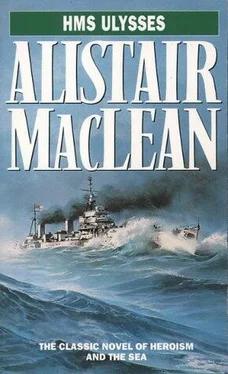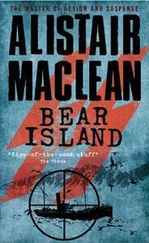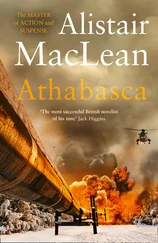He had little doubt as to her ability to survive. But what the First Lieutenant did not know, what nobody had any means of guessing, was that this howling gale was still only the deadly overture. Like some mindless and dreadful beast from an ancient and other world, the Polar monster crouched on its own doorstep, waiting. At 2230, the Ulysses crossed the Arctic Circle. The monster struck.
It struck with a feral ferocity, with an appalling savagery that smashed minds and bodies into a stunned unknowingness. Its claws were hurtling rapiers of ice that slashed across a man's face and left it welling red: its teeth were that subzero wind, gusting over 120 knots, that ripped and tore through the tissue paper of Arctic clothing and sunk home to the bone: its voice was the devil's orchestra, the roar of a great wind mingled with the banshee shrieking of tortured rigging, a requiem for fiends: its weight was the crushing power of the hurricane wind that pinned a man helplessly to a bulkhead, fighting for breath, or flung him off his feet to crash in some distant corner, broken-limbed and senseless. Baulked of prey in its 500-mile sweep across the frozen wastes of the Greenland ice-cap, it goaded the cruel sea into homicidal alliance and flung itself, titanic in its energy, ravenous in its howling, upon the cockleshell that was the Ulysses.
The Ulysses should have died then. Nothing built by man could ever have hoped to survive. She should just have been pressed under to destruction, or turned turtle, or had her back broken, or disintegrated under these mighty hammer-blows of wind and sea. But she did none of these things.
How she ever survived the insensate fury of that first attack, God only knew. The great wind caught her on the bow and flung her round in a 45ø arc and pressed her far over on her side as she fell-literally fell-forty heart-stopping feet over and down the precipitous walls of a giant trough. She crashed into the valley with a tremendous concussion that jarred every plate, every Clyde-built rivet in her hull. The vibration lasted an eternity as overstressed metal fought to re-adjust itself, as steel compressed and stretched far beyond specified breaking loads. Miraculously she held, but the sands were running out. She lay far over on her starboard side, the gunwales dipping: half a mile away, towering high above the mast-top, a great wall of water was roaring down on the helpless ship.
The "Dude" saved the day. The "Dude," alternatively known as "Persil," but officially as Engineer-Commander Dodson, immaculately clad as usual in overalls of the most dazzling white, had been at his control position in the engine-room when that tremendous gust had struck. He had no means of knowing what had happened. He had no means of knowing that the ship was not under command, that no one on the bridge had as yet recovered from that first shattering impact: he had no means of knowing that the quarter-master had been thrown unconscious into a corner of the wheel-house, that his mate, almost a child in years, was too panic-stricken to dive for the madly-spinning wheel. But he did know that the Ulysses was listing crazily, almost broadside on, and he suspected the cause.
His shouts on the bridge tube brought no reply. He pointed to the port controls, roared "Slow "in the ear of the Engineer W.O., then leapt quickly for the starboard wheel. Fifteen seconds later and it would have been too late. As it was, the accelerating starboard screw brought her round just far enough to take that roaring mountain of water under her bows, to dig her stern in to the level of the depth-charge rails, till forty feet of her airborne keel lay poised above the abyss below. When she plunged down, again tnat same shuddering vibration enveloped the entire hull. The fo'c'sle disappeared far below the surface, the sea flowing over and past the armoured side of 'A'turret. But she was bows on again. At once the "Dude" signalled his W.O. for more revolutions, cut back the starboard engine.
Below decks, everything was an unspeakable shambles. On the mess decks, steel lockers in their scores had broken adrift, been thrown in a dozen different directions, bursting hasps, and locks, spilling their contents everywhere. Hammocks had been catapulted from their racks, smashed crockery littered the decks: tables were twisted and smashed, broken stools stuck up at crazy angles, books, papers, teapots, kettles and crockery were scattered in insane profusion. And amidst this jumbled, sliding wreckage, hundreds of shouting, cursing, frightened and exhausted men struggled to their feet, or knelt, or sat, or just lay still.
Surgeon-Commander Brooks and Lieutenant Nicholls, with an inspired, untiring padre as good as a third doctor, were worked off their feet.
The veteran Leading S.B.A. Johnson, oddly enough, was almost useless-he was violently sick much of the time, seemed to have lost all heart: no one knew why, it was just one of these things and he had taken all he could.
Men were brought in to the Sick Bay in their dozens, in their scores, a constant trek that continued all night long as the Ulysses fought for her life, a trek that soon overcrowded the meagre space available and turned the wardroom into an emergency hospital. Bruises, cuts, dislocations, concussions, fractures-the exhausted doctors experienced everything that night. Serious injuries were fortunately rare, and inside three hours there were only nine bed-patients in the Sick Bay, including A.B. Ferry, his already mangled arm smashed in two places-a bitterly protesting Riley and his fellow-mutineers had been unceremoniously turfed out to make room for the more seriously injured.
About 2330, Nicholls was called to treat the Kapok Kid. Lurching, falling and staggering in the wildly gyrating ship, he finally found the Navigator in his cabin. He looked very unhappy.
Nicholls eyed him speculatively, saw the deep, ugly gash on his forehead, the swollen ankle peeping out below the Kapok Kid's Martian survival suit. Bad enough, but hardly a borderline case, although one wouldn't have thought so from the miserable, worried expression.
Nicholls grinned inwardly.
"Well, Horatio," he said unkindly, "what's supposed to be the matter with you? Been drinking again?"
"It's my back, Johnny," he muttered. He turned facedown on the bunk.
"Have a look at it, will you?"
Nicholl's expression changed. He moved forward, then stopped short.
"How the hell can I," he demanded irritably, "when you're wearing that damned ugly suit of yours?"
"That what I mean," said the Kapok Kid anxiously. "I was thrown against the searchlight controls, all knobs and nasty, sharp projections.
Is it torn? Is it ripped, cut in any way? Are the seams------"
"Well, for God's sake! Do you mean to tell me------?"
Nicholls sank back incredulously on a locker.
The Kapok Kid looked at him hopefully.
"Does that mean it's all right?"
"Of course it's all right! If it's a blasted tailor you want, why the hell------"
"Enough!" The Kapok Kid swung briskly on to the side of his bunk, lifting an admonitory hand. "There is work for you, sawbones." He touched his bleeding forehead. "Stitch this up and waste no time about it. A man of my calibre is urgently needed on the bridge... I'm the only man on this ship who has the faintest idea where we are."
Busy with a swab, Nicholls grinned. "And where are we?" "I don't know," said the Kapok Kid frankly. "That's what's so urgent about it... But I do know where I was back in Henley. Did I ever tell you...?"
The Ulysses did not die. Time and again that night, hove to with the wind fine of her starboard bow, as her bows crashed into and under the far shoulder of a trough, it seemed that she could never shake free from the great press of water. But time and again she did just that, shuddering, I quivering under the fantastic strain. A thousand times before dawn officers and men blessed the genius of the Clyde ship-yard that had made her: a thousand times they cursed the blind malevolence of that great storm that put the Ulysses on the rack.
Читать дальше
Конец ознакомительного отрывка
Купить книгу












